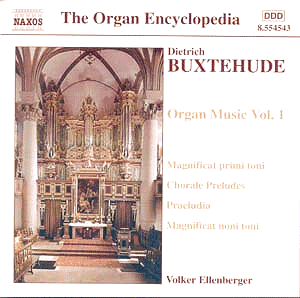Dietrich BUXTEHUDE (1637-1707)
Organ Music Vol. I
Magnificat primi toni, BuxWV 203 [8:50]
Herr Christ, der einig Gottes Sohn, BuxWV 191 [3:25]
Praeludium in G major, BuxWV 147 [3:47]
Magnificat noni toni, BuxWV 205 [4:04
Herr Christ, der einig Gottes Sohn, BuxWV 192 [3:10]
Praeludium in D major, BuxWV 139 [6:22]
Ach Herr; mich armen S¸nder, BuxWV 178 [2:45]
Wir danken dir, Herr Jesu Christ, BUXWV 224 [1:34]
Jesus Christus, wiser Heiland. BuxWV 198 [1:53]
Praeludium in A minor, BuxWV 152 [5:08]
Gott der Vater wohn uns bei, BuxWV 190 [3:25]
Praeludium in G minor, BuxWV 149 [9:20]
 Volker Ellenberger, organ Volker Ellenberger, organ
Rec: December 1999.
 NAXOS 8.554543
[53.43] NAXOS 8.554543
[53.43]
Crotchet
AmazonUK
AmazonUS
Amazon
recommendations |
 |
This CD is the first in a series of recordings of Buxtehude's organ music.
It is part of Naxos's excellent Organ Encyclopedia, which features recordings
of organ works by many well-known and lesser-known composers.
Buxtehude's organ music was so excellent that he was very well-known during
his lifetime, and, listening to this recording, one can immediately hear
why. His music stands at the crossroads of traditional German music and the
development of new styles imported from France and Italy. His organ music
covers all possible forms for the instrument, and this disc includes several
preludes, chorales and two Magnificats.
Ranging from the flamboyant (the Magnificat primi toni) to the sublime (some
of the chorales, such as Herr Christ, der einig Gottes Sohn), this music
is well-performed by Volker Ellenberger. His choice of registration seems
appropriate for most of the pieces, being very large and spacious in some
works, such as the Magnificat primi toni, and more intimate and reserved
in the Magnificat noni toni, for example.
However, in comparing this recording with the excellent complete set by Olivier
Vernet (on Ligia Digital), I am surprised by the differences in tempo -
Ellenberger chooses slower tempi in every case. Whether or not this is considered
to be judicious depends, naturally, on each listener. I feel that it is justified
in some of the chorales, but this is very subjective - I tend to prefer listening
to chorales at slower tempi. I find it less appropriate in the large-scale
Prelude in G minor, where the music tends to sound a bit bland at this tempo.
Overall, these slower tempi give the music a more reserved feeling than that
which is heard on Vernet's recording.
Another negative point is the recording itself, which seems flat and lacking
in relief. It sounds like there is very little space around the organ, which
is quite different from what one hears on most organ recordings, where the
natural resonance of the church housing the organ is heard.
In any case, this is a good performance of a selection of Buxtehude's organ
works. Presumably, this will become a complete set in the near future. While
Olivier Vernet probably gives a more convincing performance, this budget
disc is worth listening to for those curious about Buxtehude's organ music.
Kirk McElhearn

